2025
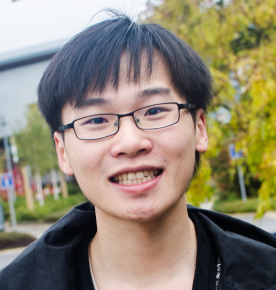 Siyu Chen is selected as runner-up of the Sam Edwards PhD Thesis Prize of the Institute of Physics for the best thesis in the field of theoretical condensed matter physics. Siyu's thesis proposes a new computational method exploiting non-uniform grids to accelerate phonon and electron-phonon calculations. Using this method, Siyu also explores the properties of two-dimensional and three-dimensional topological materials, superconductors, and high pressure hydrides. Congratulations!
Siyu Chen is selected as runner-up of the Sam Edwards PhD Thesis Prize of the Institute of Physics for the best thesis in the field of theoretical condensed matter physics. Siyu's thesis proposes a new computational method exploiting non-uniform grids to accelerate phonon and electron-phonon calculations. Using this method, Siyu also explores the properties of two-dimensional and three-dimensional topological materials, superconductors, and high pressure hydrides. Congratulations!
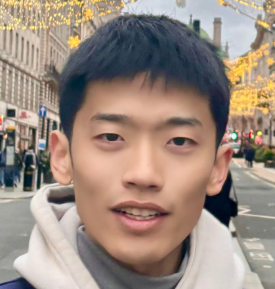 Mingran Kong successfully defends his MPhil thesis. The work proposes a novel theoretical framework to study electron-phonon coupling in the presence of anharmonic phonon-phonon interactions. Mingran will continue his work in the group to pursue a PhD. Good luck!
Mingran Kong successfully defends his MPhil thesis. The work proposes a novel theoretical framework to study electron-phonon coupling in the presence of anharmonic phonon-phonon interactions. Mingran will continue his work in the group to pursue a PhD. Good luck!
2024
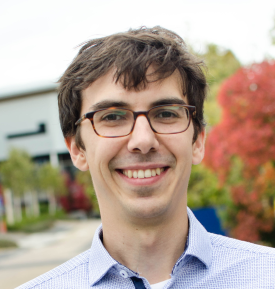 Bartomeu wins the Philip Leverhulme Prize in Physics, presented by the Leverhulme Trust for work on computational physics, computational materials science, electronic structure, and energy materials. The Philip Leverhulme Prizes recognise and celebrate the achievements of outstanding researchers whose work has already attracted international recognition and whose future careers are exceptionally promising, and a full list of awardees can be found here.
Bartomeu wins the Philip Leverhulme Prize in Physics, presented by the Leverhulme Trust for work on computational physics, computational materials science, electronic structure, and energy materials. The Philip Leverhulme Prizes recognise and celebrate the achievements of outstanding researchers whose work has already attracted international recognition and whose future careers are exceptionally promising, and a full list of awardees can be found here.
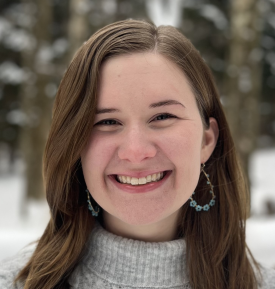 Audrey Miles successfully completes her MPhil thesis and wins the JD Lewins Prize for the Best Distinction Level Project and Dissertation. The work develops a machine learning model that enables the simulation of nuclear fuels accurately and efficiently. Audrey will next pursue a PhD at the University of California Irvine. Congratulations and good luck!
Audrey Miles successfully completes her MPhil thesis and wins the JD Lewins Prize for the Best Distinction Level Project and Dissertation. The work develops a machine learning model that enables the simulation of nuclear fuels accurately and efficiently. Audrey will next pursue a PhD at the University of California Irvine. Congratulations and good luck!
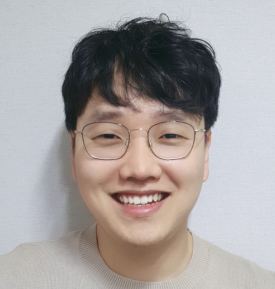 Sun-Woo Kim is awarded a Leverhulme Trust Early Career Fellowship to be hosted at the Department of Materials Science and Metallurgy of the University of Cambridge. This is a prestigious three-year position that will allow Sun-Woo to start his own independent research career in September 2024. During the fellowship, Sun-Woo will work on the interplay between charge density waves and superconductivity. Congratulations!
Sun-Woo Kim is awarded a Leverhulme Trust Early Career Fellowship to be hosted at the Department of Materials Science and Metallurgy of the University of Cambridge. This is a prestigious three-year position that will allow Sun-Woo to start his own independent research career in September 2024. During the fellowship, Sun-Woo will work on the interplay between charge density waves and superconductivity. Congratulations!
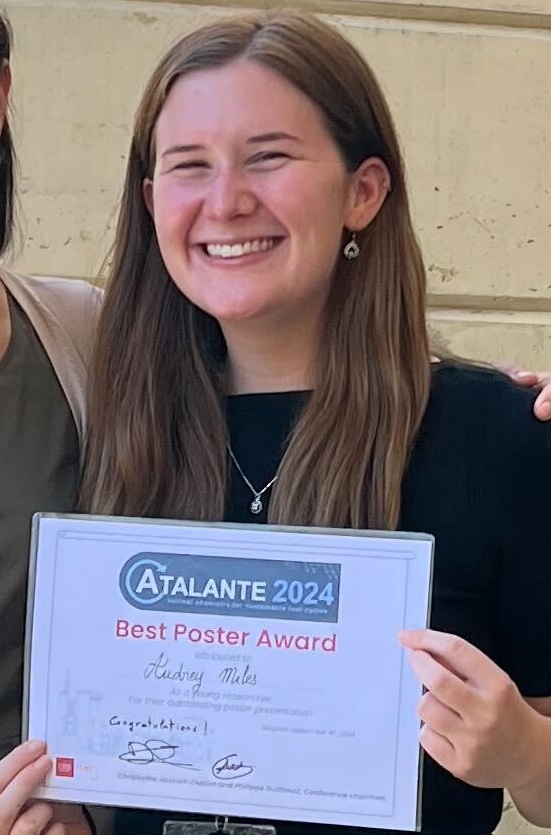 Audrey Miles wins the Best Poster Prize at the 6th Atalante Conference on Nuclear Chemistry for Sustainable Fuel Cycles in Avignon, France. Audrey has received the prize for her work building a machine learning model that enables simulating nuclear fuels accurately and efficiently. Congratulations!
Audrey Miles wins the Best Poster Prize at the 6th Atalante Conference on Nuclear Chemistry for Sustainable Fuel Cycles in Avignon, France. Audrey has received the prize for her work building a machine learning model that enables simulating nuclear fuels accurately and efficiently. Congratulations!
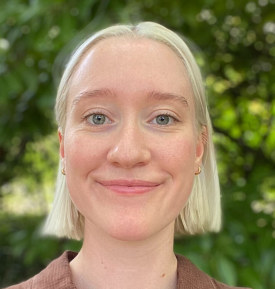 Eleanor Davison successfully defends her MPhil thesis. The work explores the diffusion and dynamics of excitons in the presence of van Hove singularities. Eleanor will continue her work in the group to pursue a PhD. Good luck!
Eleanor Davison successfully defends her MPhil thesis. The work explores the diffusion and dynamics of excitons in the presence of van Hove singularities. Eleanor will continue her work in the group to pursue a PhD. Good luck!
 Sun-Woo Kim wins the KSEAUK Outstanding Early Career Research Award. The award recognises exceptional contributions to science and technology by early career researchers, and you can read about all the winners here. Congratulations!
Sun-Woo Kim wins the KSEAUK Outstanding Early Career Research Award. The award recognises exceptional contributions to science and technology by early career researchers, and you can read about all the winners here. Congratulations!
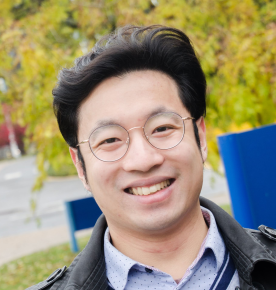 Bo Peng wins the Sam Edwards PhD Thesis Prize of the Institute of Physics for the best thesis in the field of theoretical condensed matter physics. Bo's thesis explored various aspects of topological materials, highlighting pioneering work in the exploration of multi-gap Euler topology in the phonon spectrum of real materials. Bo is currently the Nevile Junior Research Fellow at Magdalene College Cambridge, exploring, amongst other things, the use of fullerenes to trap and manipulate atoms for various applications to quantum science. Congratulations!
Bo Peng wins the Sam Edwards PhD Thesis Prize of the Institute of Physics for the best thesis in the field of theoretical condensed matter physics. Bo's thesis explored various aspects of topological materials, highlighting pioneering work in the exploration of multi-gap Euler topology in the phonon spectrum of real materials. Bo is currently the Nevile Junior Research Fellow at Magdalene College Cambridge, exploring, amongst other things, the use of fullerenes to trap and manipulate atoms for various applications to quantum science. Congratulations!
 Sun-Woo Kim wins a Best Poster Prize at the QUANTUMatter2024 Conference in Donostia, Spain. Sun-Woo has received the prize for his work critically analysing two room temperature superconductivity claims, and you can read more about this research in these papers: Nature Communications, npj Computational Materials. Congratulations!
Sun-Woo Kim wins a Best Poster Prize at the QUANTUMatter2024 Conference in Donostia, Spain. Sun-Woo has received the prize for his work critically analysing two room temperature superconductivity claims, and you can read more about this research in these papers: Nature Communications, npj Computational Materials. Congratulations!
 Siyu Chen successfully defends his PhD thesis. The work proposes a new computational method exploiting non-uniform grids to accelerate phonon and electron-phonon calculations. Using this method, Siyu also explores the properties of two-dimensional and three-dimensional topological materials, superconductors, and high pressure hydrides. Siyu will continue working in the Monserrat Lab as a Postdoctoral Research Associate to further develop our phonon and electron-phonon software. Looking forward to more exciting results!
Siyu Chen successfully defends his PhD thesis. The work proposes a new computational method exploiting non-uniform grids to accelerate phonon and electron-phonon calculations. Using this method, Siyu also explores the properties of two-dimensional and three-dimensional topological materials, superconductors, and high pressure hydrides. Siyu will continue working in the Monserrat Lab as a Postdoctoral Research Associate to further develop our phonon and electron-phonon software. Looking forward to more exciting results!
2023
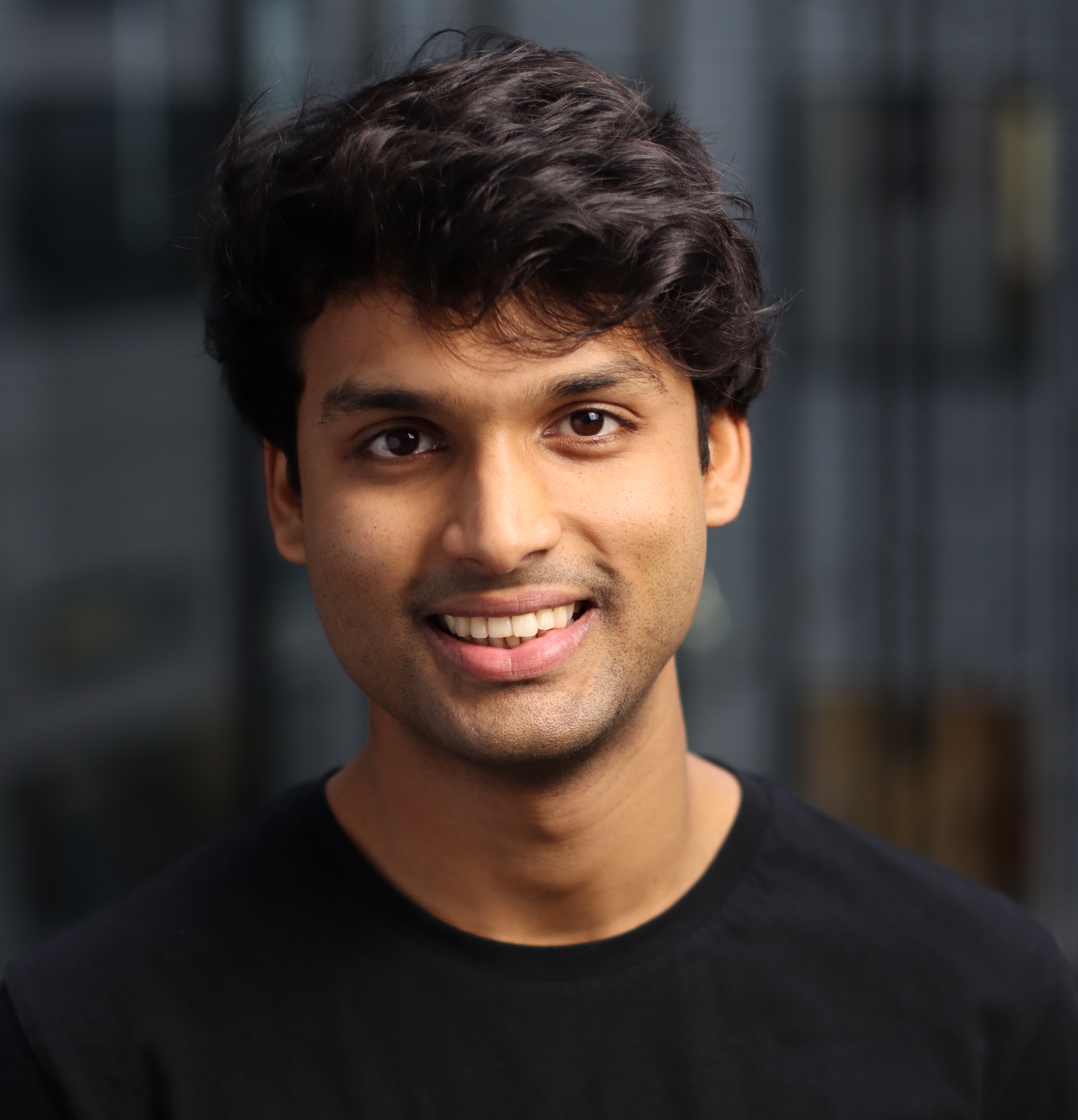 Arjun Ashoka successfully defends his PhD thesis. The work focuses on studying quantum processes in disordered materials combining experiment and theory. His experimental work develops new techniques for 3D ultrafast microscopy with which he investigates a range of quantum processes, from the formation of entangled states in an organic semiconductor to spin domain formation in halide perovskites. His theoretical work develops the foundation with which to study the sub-bandgap absorption tail in high performance semiconductors that arises from dynamic disorder through the presence of lattice vibrations. Arjun is now building his independent research career as a Junior Research Fellow at Trinity College Cambridge. Good luck!
Arjun Ashoka successfully defends his PhD thesis. The work focuses on studying quantum processes in disordered materials combining experiment and theory. His experimental work develops new techniques for 3D ultrafast microscopy with which he investigates a range of quantum processes, from the formation of entangled states in an organic semiconductor to spin domain formation in halide perovskites. His theoretical work develops the foundation with which to study the sub-bandgap absorption tail in high performance semiconductors that arises from dynamic disorder through the presence of lattice vibrations. Arjun is now building his independent research career as a Junior Research Fellow at Trinity College Cambridge. Good luck!
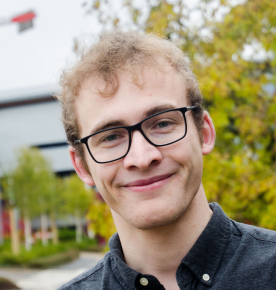 Gunnar Lange successfully defends his PhD thesis. The work explores the topological features of electron and phonon spectra, highlighting the existence of topological phases beyond the standard characterisation based on symmetry eigenvalues. Gunnar will continue his great work at the Max Planck Institute for the Physics of Complex Systems in Dresden. Good luck!
Gunnar Lange successfully defends his PhD thesis. The work explores the topological features of electron and phonon spectra, highlighting the existence of topological phases beyond the standard characterisation based on symmetry eigenvalues. Gunnar will continue his great work at the Max Planck Institute for the Physics of Complex Systems in Dresden. Good luck!
 Sun-Woo Kim wins the 2023 Young Physicist Award presented by the Korean Physical Society. The prize is presented annually to early-career researchers and you can read more about this here (in Korean). Congratulations Sun-Woo!
Sun-Woo Kim wins the 2023 Young Physicist Award presented by the Korean Physical Society. The prize is presented annually to early-career researchers and you can read more about this here (in Korean). Congratulations Sun-Woo!
 Bo Peng successfully defends his PhD thesis. The work explores the topological features of phonon spectra, with highlights including the prediction of light-induced topological transitions in perovskites and the pioneering exploration of multi-gap Euler topology in real materials. Bo has also completed a significant number of side projects, which include the study of light emission in doped perovskites nanocrystals, photostriction in halide perovskites, and monolayer fullerenes. Bo is now building his independent research career with a Nevile Junior Research Fellow at Magdalene College Cambridge. Good luck!
Bo Peng successfully defends his PhD thesis. The work explores the topological features of phonon spectra, with highlights including the prediction of light-induced topological transitions in perovskites and the pioneering exploration of multi-gap Euler topology in real materials. Bo has also completed a significant number of side projects, which include the study of light emission in doped perovskites nanocrystals, photostriction in halide perovskites, and monolayer fullerenes. Bo is now building his independent research career with a Nevile Junior Research Fellow at Magdalene College Cambridge. Good luck!
 Bartomeu Monserrat is promoted to Professor of Materials Physics, starting in October 2023. This promotion recognises the research work of the entire group, as well as our teaching and service contributions.
Bartomeu Monserrat is promoted to Professor of Materials Physics, starting in October 2023. This promotion recognises the research work of the entire group, as well as our teaching and service contributions.
 Arjun Ashoka is awarded a Junior Research Fellowship at Trinity College Cambridge. This is a prestigious four-year position that will allow Arjun to start his own independent research career in October 2023. Arjun's work will focus on investigating how to drive single phonons and watch their effect on electronic transport on femtosecond timescales in semiconductors. Good luck!
Arjun Ashoka is awarded a Junior Research Fellowship at Trinity College Cambridge. This is a prestigious four-year position that will allow Arjun to start his own independent research career in October 2023. Arjun's work will focus on investigating how to drive single phonons and watch their effect on electronic transport on femtosecond timescales in semiconductors. Good luck!
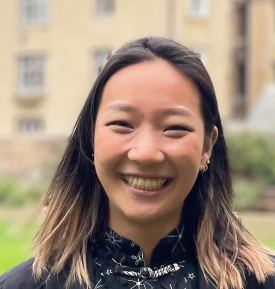 Emily Chen successfully defends her MPhil thesis. The work looks at the phonons in layered perovskites, characterising their properties for the first time. Emily will continue her research pursuing a PhD at Stanford University. Good luck!
Emily Chen successfully defends her MPhil thesis. The work looks at the phonons in layered perovskites, characterising their properties for the first time. Emily will continue her research pursuing a PhD at Stanford University. Good luck!
- Jackson Weaver successfully defends his MPhil thesis. The work looks at phonons in incommensurate crystals, with a focus on their transport properties. Jackson will continue his research pursuing a PhD at the University of Chicago. Good luck!
2022
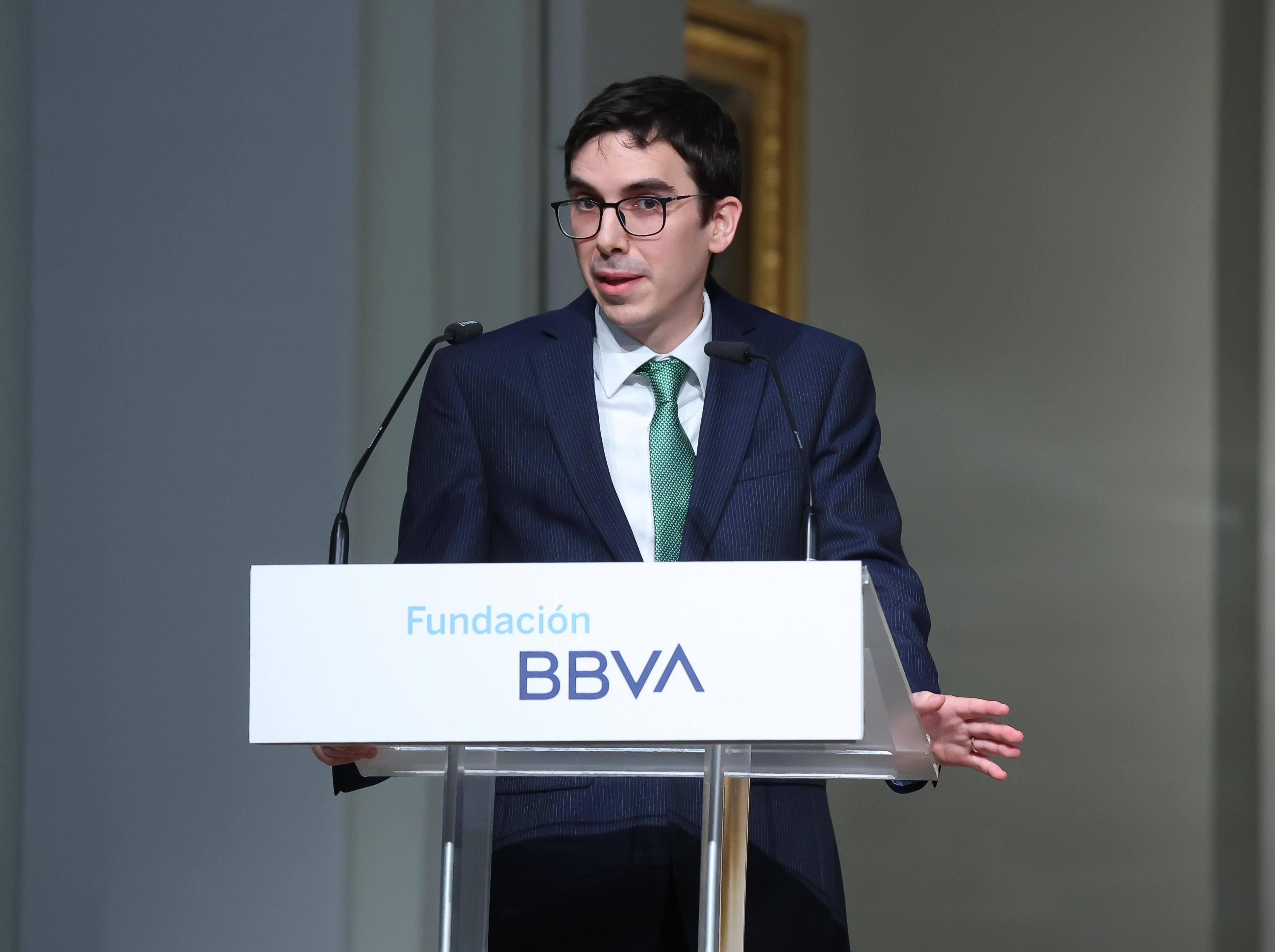 Bartomeu Monserrat wins the 2022 Young Researcher in Theoretical Physics Prize presented by the Spanish Royal Society of Physics and the BBVA Foundation. The Prize has been presented annually since 1968, and you can read more about this here (in Spanish).
Bartomeu Monserrat wins the 2022 Young Researcher in Theoretical Physics Prize presented by the Spanish Royal Society of Physics and the BBVA Foundation. The Prize has been presented annually since 1968, and you can read more about this here (in Spanish).
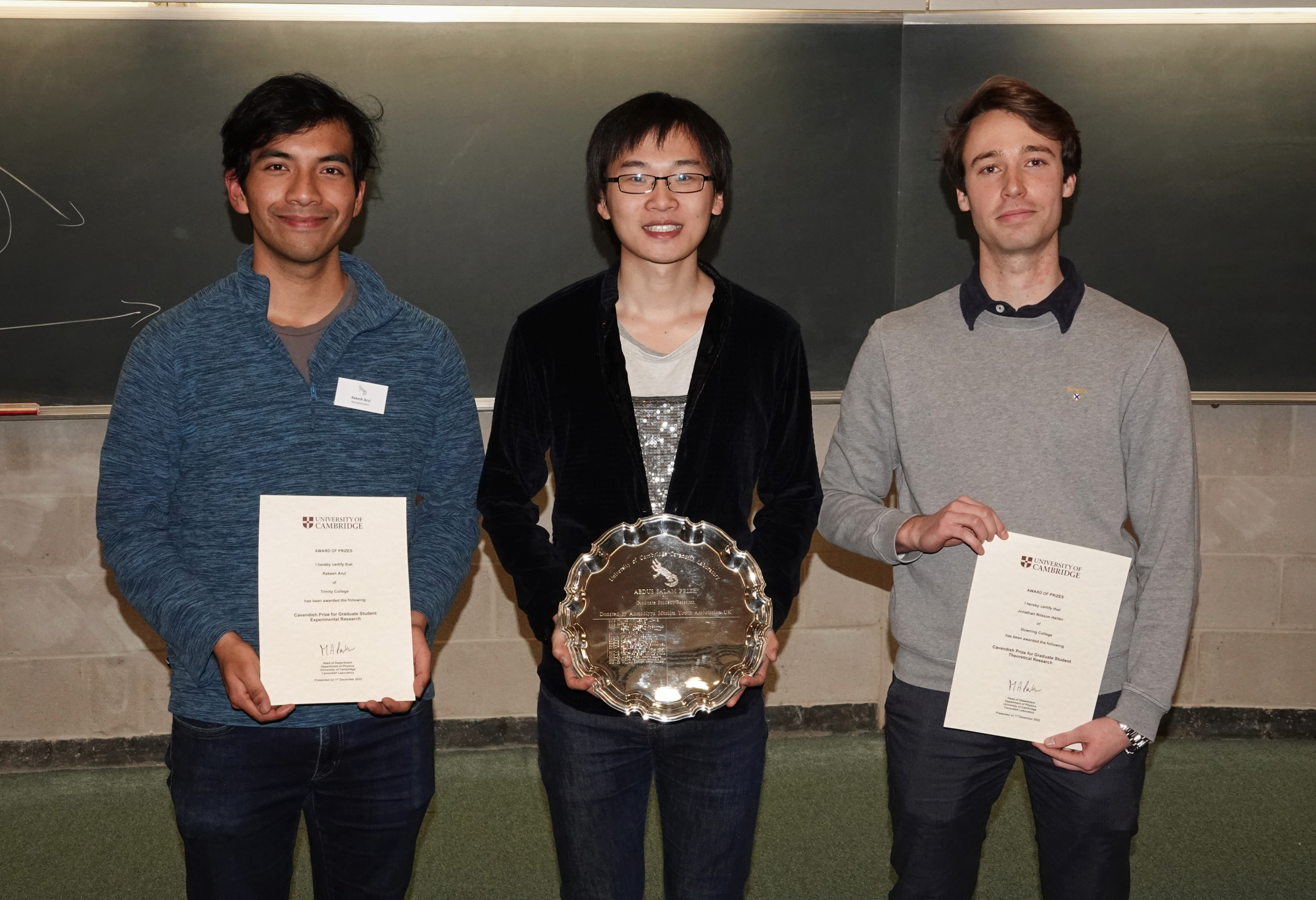 Siyu Chen wins the 2023 Abdus Salam Prize in Computational Physics, presented annually to recognise outstanding work by a PhD student in the Physics Department of the University of Cambridge. Siyu has received the prize for his work on Nonuniform grids for Brillouin zone integration and interpolation. Read more about this here.
Siyu Chen wins the 2023 Abdus Salam Prize in Computational Physics, presented annually to recognise outstanding work by a PhD student in the Physics Department of the University of Cambridge. Siyu has received the prize for his work on Nonuniform grids for Brillouin zone integration and interpolation. Read more about this here.
 Arjun Ashoka wins the 2023 Cavendish Prize in Experimental Physics, presented annually to recognise outstanding work by a PhD student in the Physics Department of the University of Cambridge. Arjun has received the prize for his work on Quantum processes in disordered materials. Read more about this here.
Arjun Ashoka wins the 2023 Cavendish Prize in Experimental Physics, presented annually to recognise outstanding work by a PhD student in the Physics Department of the University of Cambridge. Arjun has received the prize for his work on Quantum processes in disordered materials. Read more about this here.
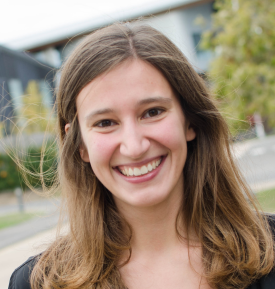 Ivona Bravić successfully defends her PhD thesis. The work explores the role of disorder, both static and dynamic, on the optoelectronic properties of semiconductors. Highlights include the microscopic understanding of how doping perovskite nanocrystals can be used to control their light emission properties, and the role of dynamic disorder in the optoelectronic properties of BiOI, a record-sensitivity X-ray detector material. Ivona will continue her excellent work in the energy area at LBD-Beratungsgesellschaft. Good luck!
Ivona Bravić successfully defends her PhD thesis. The work explores the role of disorder, both static and dynamic, on the optoelectronic properties of semiconductors. Highlights include the microscopic understanding of how doping perovskite nanocrystals can be used to control their light emission properties, and the role of dynamic disorder in the optoelectronic properties of BiOI, a record-sensitivity X-ray detector material. Ivona will continue her excellent work in the energy area at LBD-Beratungsgesellschaft. Good luck!
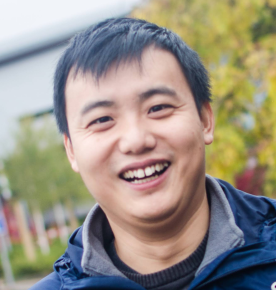 Dr Yun Liu has started a new position as a Research Scientist at the Institute of High Performance Computing in Singapore. He can be reached at this email address. Good luck Yun!
Dr Yun Liu has started a new position as a Research Scientist at the Institute of High Performance Computing in Singapore. He can be reached at this email address. Good luck Yun!
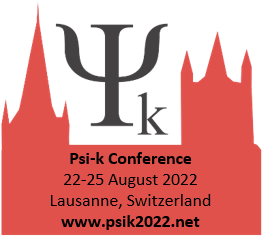 Bo Peng wins a Poster Commendation at the Psi-K 2022 Conference. Commendations have been awarded to 60 posters among the 715 presented. Bo has received the prize for his work on Non-Abelian braiding of phonons, and you can read more about this research in these papers: Nature Communications, Physical Review B. Congratulations!
Bo Peng wins a Poster Commendation at the Psi-K 2022 Conference. Commendations have been awarded to 60 posters among the 715 presented. Bo has received the prize for his work on Non-Abelian braiding of phonons, and you can read more about this research in these papers: Nature Communications, Physical Review B. Congratulations!
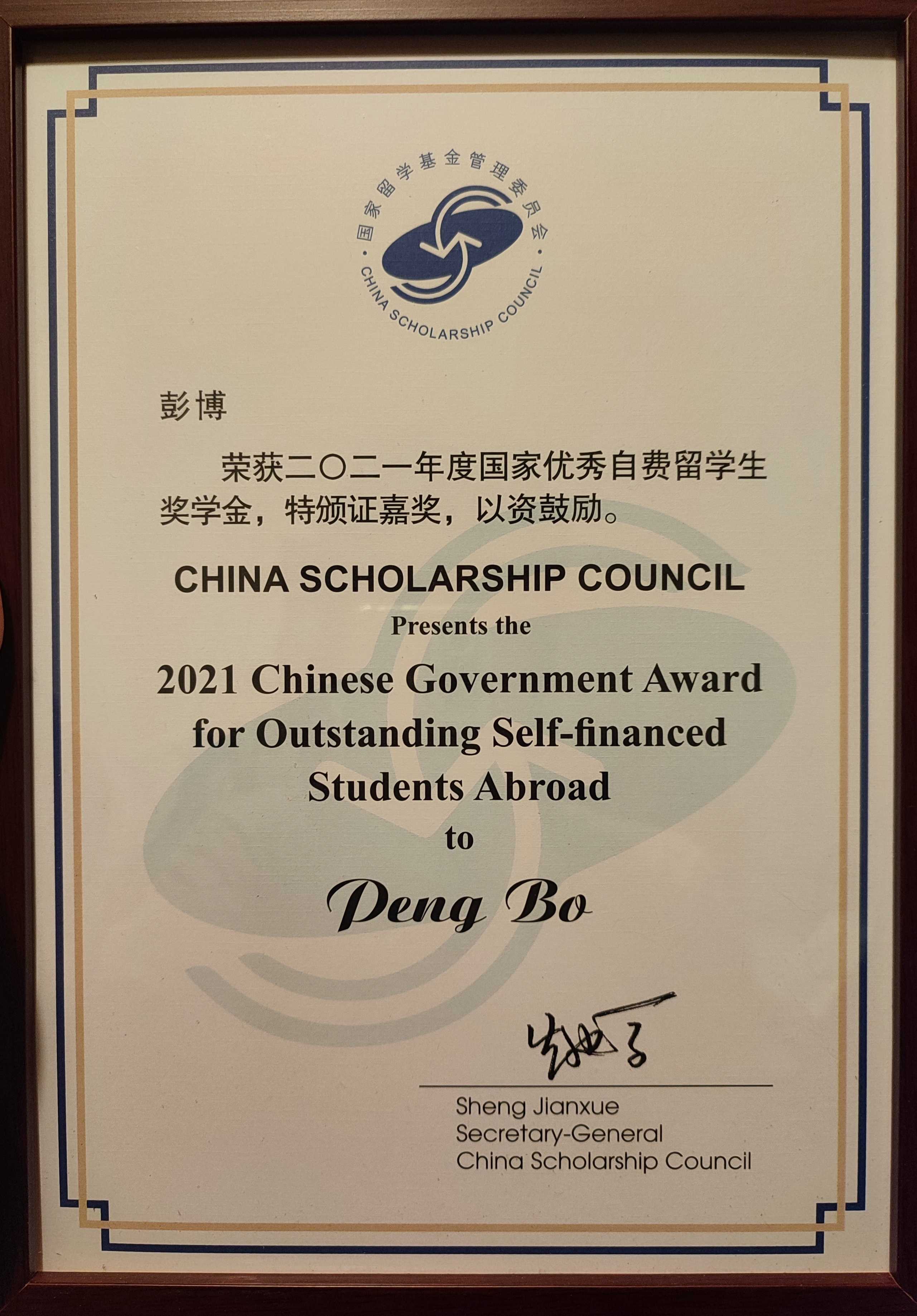 Bo Peng wins a 2021 Chinese Government Award for Outstanding Students Abroad, presented annually by the China Scholarship Council to recognise outstanding Chinese students all over the world. Congratulations Bo!
Bo Peng wins a 2021 Chinese Government Award for Outstanding Students Abroad, presented annually by the China Scholarship Council to recognise outstanding Chinese students all over the world. Congratulations Bo!
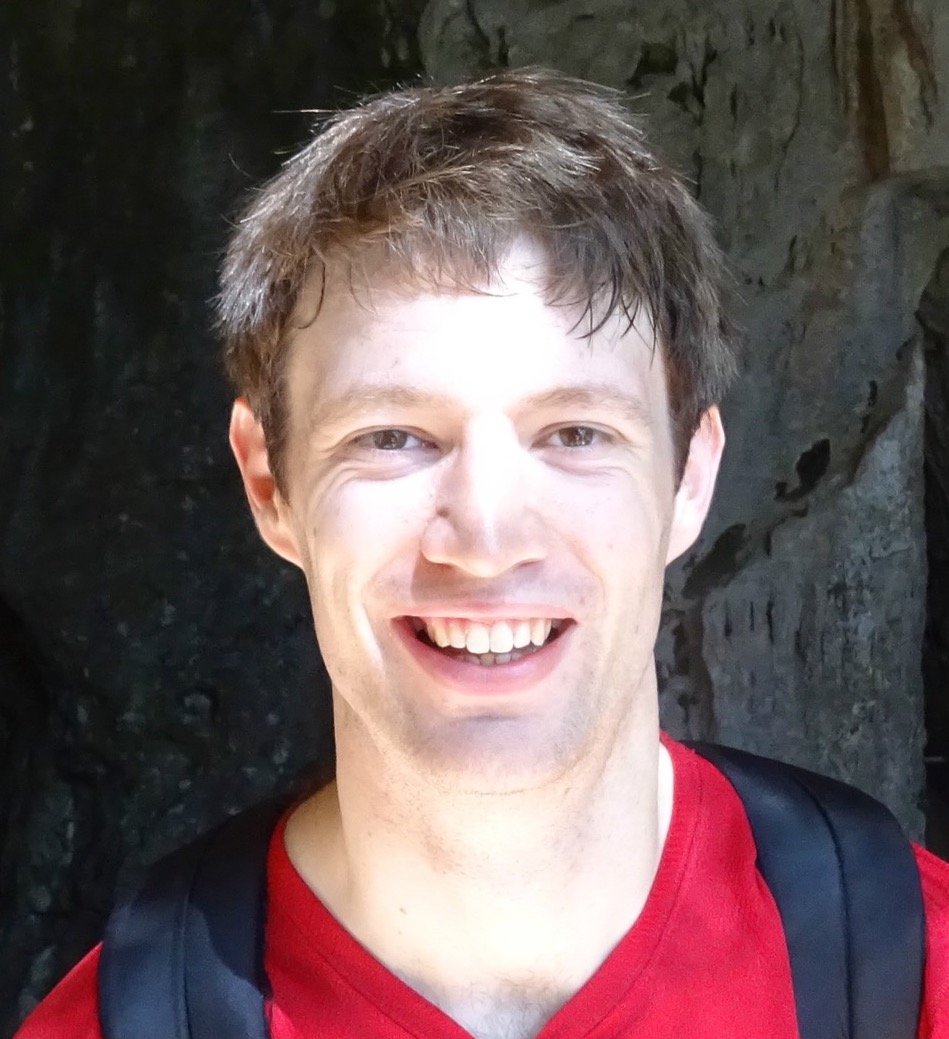 Alan Bowman wins the Woodruff Thesis Prize of the Institute of Physics for the best thesis in the field of thin film and surface science. Alan's thesis studied new materials for solar cells with a comprehensive approach including both experimental and theoretical work. Alan is currently working as a Postdoc at the École Polytechnique Fédérale de Lausanne in Switzerland, investigating the conversion of CO2 to other chemicals using nanoparticles. Congratulations!
Alan Bowman wins the Woodruff Thesis Prize of the Institute of Physics for the best thesis in the field of thin film and surface science. Alan's thesis studied new materials for solar cells with a comprehensive approach including both experimental and theoretical work. Alan is currently working as a Postdoc at the École Polytechnique Fédérale de Lausanne in Switzerland, investigating the conversion of CO2 to other chemicals using nanoparticles. Congratulations!
 We receive a Programme Grant from the Engineering and Physical Sciences Research Council (EPSRC) as part of a team of Cambridge and Oxford scientists. The award of £8.6 million will support research on transport phenomena in a wide range of materials, using both experimental and computational techniques. You can read more about this here.
We receive a Programme Grant from the Engineering and Physical Sciences Research Council (EPSRC) as part of a team of Cambridge and Oxford scientists. The award of £8.6 million will support research on transport phenomena in a wide range of materials, using both experimental and computational techniques. You can read more about this here.
 We receive a Critical Mass Grant from the Engineering and Physical Sciences Research Council (EPSRC) as part of a team of theorists across several Cambridge departments. The award of £3.7 million will support research on theory of condensed matter with a particular focus on dynamical phenomena. You can read more about this here.
We receive a Critical Mass Grant from the Engineering and Physical Sciences Research Council (EPSRC) as part of a team of theorists across several Cambridge departments. The award of £3.7 million will support research on theory of condensed matter with a particular focus on dynamical phenomena. You can read more about this here.
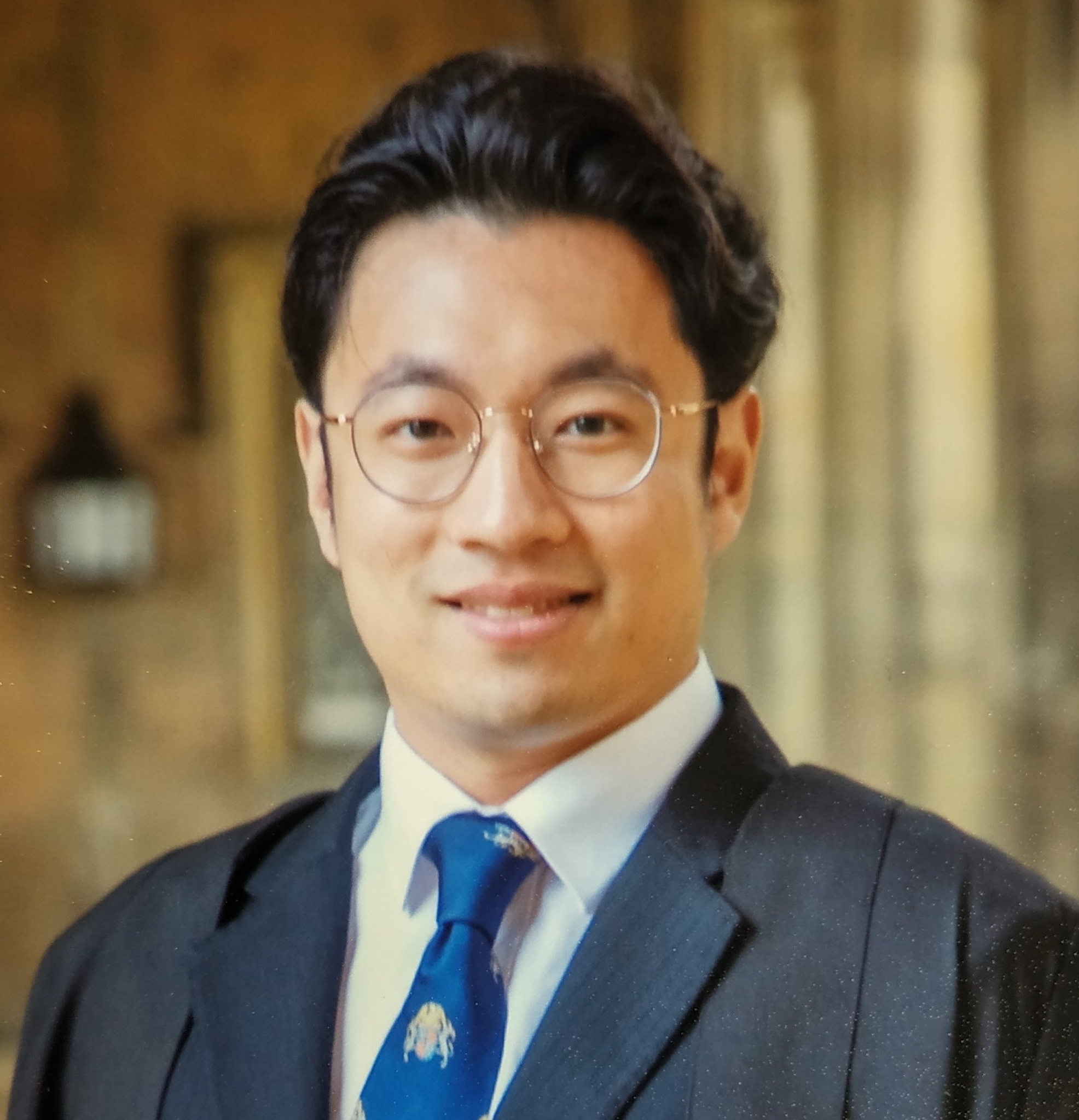 Bo Peng is awarded the Nevile Junior Research Fellowship at Magdalene College Cambridge. This is a prestigious three-year position that will allow Bo to start his own independent research career in October 2022. Bo's work will focus on searching for new materials hosting topological phonons and their potential applications in information technologies. Good luck!
Bo Peng is awarded the Nevile Junior Research Fellowship at Magdalene College Cambridge. This is a prestigious three-year position that will allow Bo to start his own independent research career in October 2022. Bo's work will focus on searching for new materials hosting topological phonons and their potential applications in information technologies. Good luck!
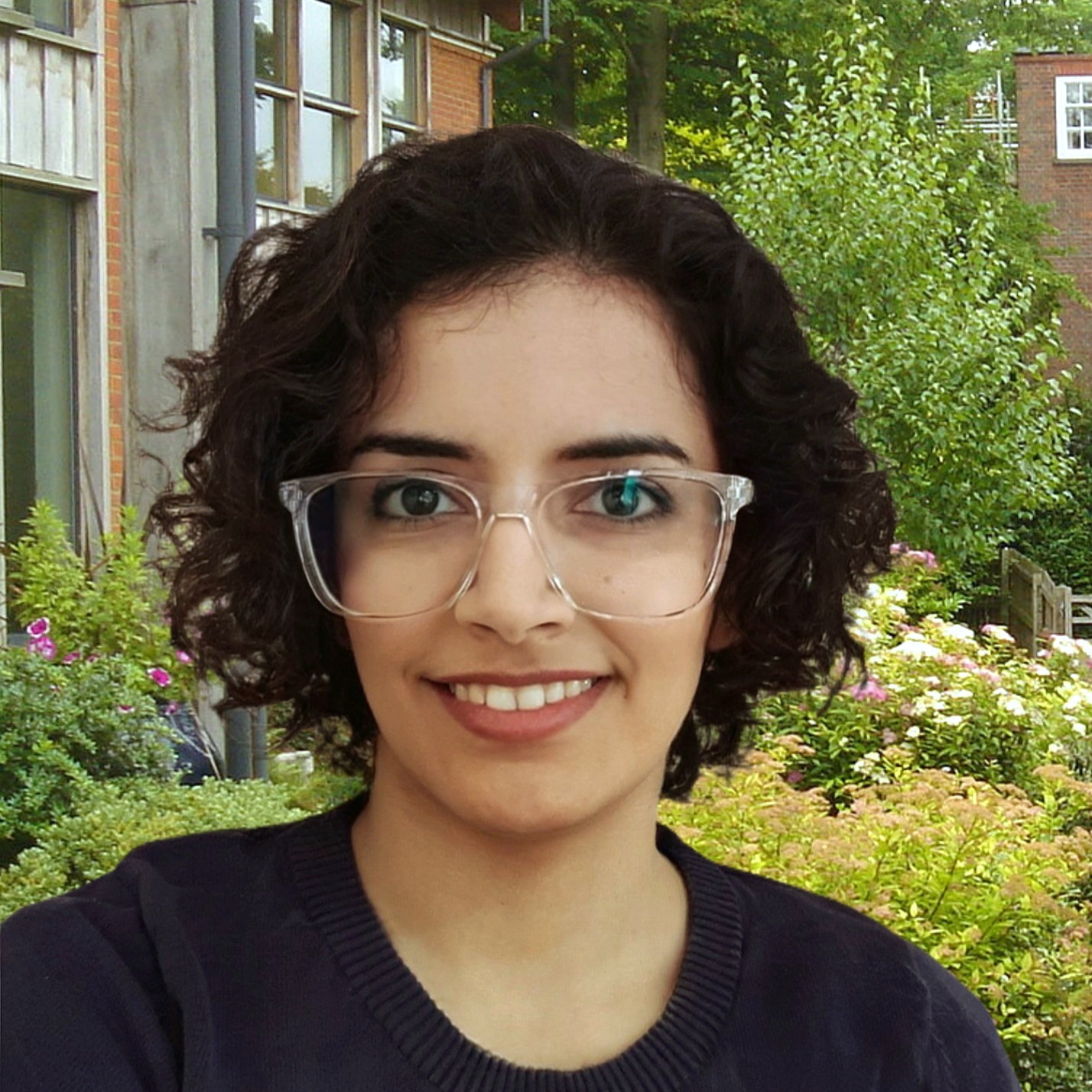 Alya Bin Thabet Alqaydi successfully defends her MPhil thesis. The work looks at graph neural networks to predict material properties, demonstrating performances surpassing the current state-of-the-art. Alya will continue her research towards a PhD with the group.
Alya Bin Thabet Alqaydi successfully defends her MPhil thesis. The work looks at graph neural networks to predict material properties, demonstrating performances surpassing the current state-of-the-art. Alya will continue her research towards a PhD with the group.
2021
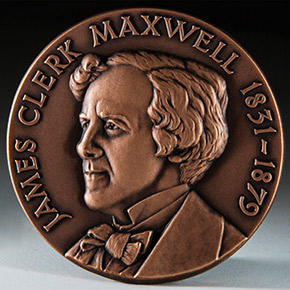 Bartomeu wins the 2021 James Clerk Maxwell Medal and Prize, presented by the Institute of Physics for exceptional contributions to the development of computational techniques that bring temperature to modern electronic structure methods, and their application to topological materials, photovoltaics, superconductors and planetary physics. The Medal was first presented in 1962, and a full list of awardees can be found here.
Bartomeu wins the 2021 James Clerk Maxwell Medal and Prize, presented by the Institute of Physics for exceptional contributions to the development of computational techniques that bring temperature to modern electronic structure methods, and their application to topological materials, photovoltaics, superconductors and planetary physics. The Medal was first presented in 1962, and a full list of awardees can be found here.
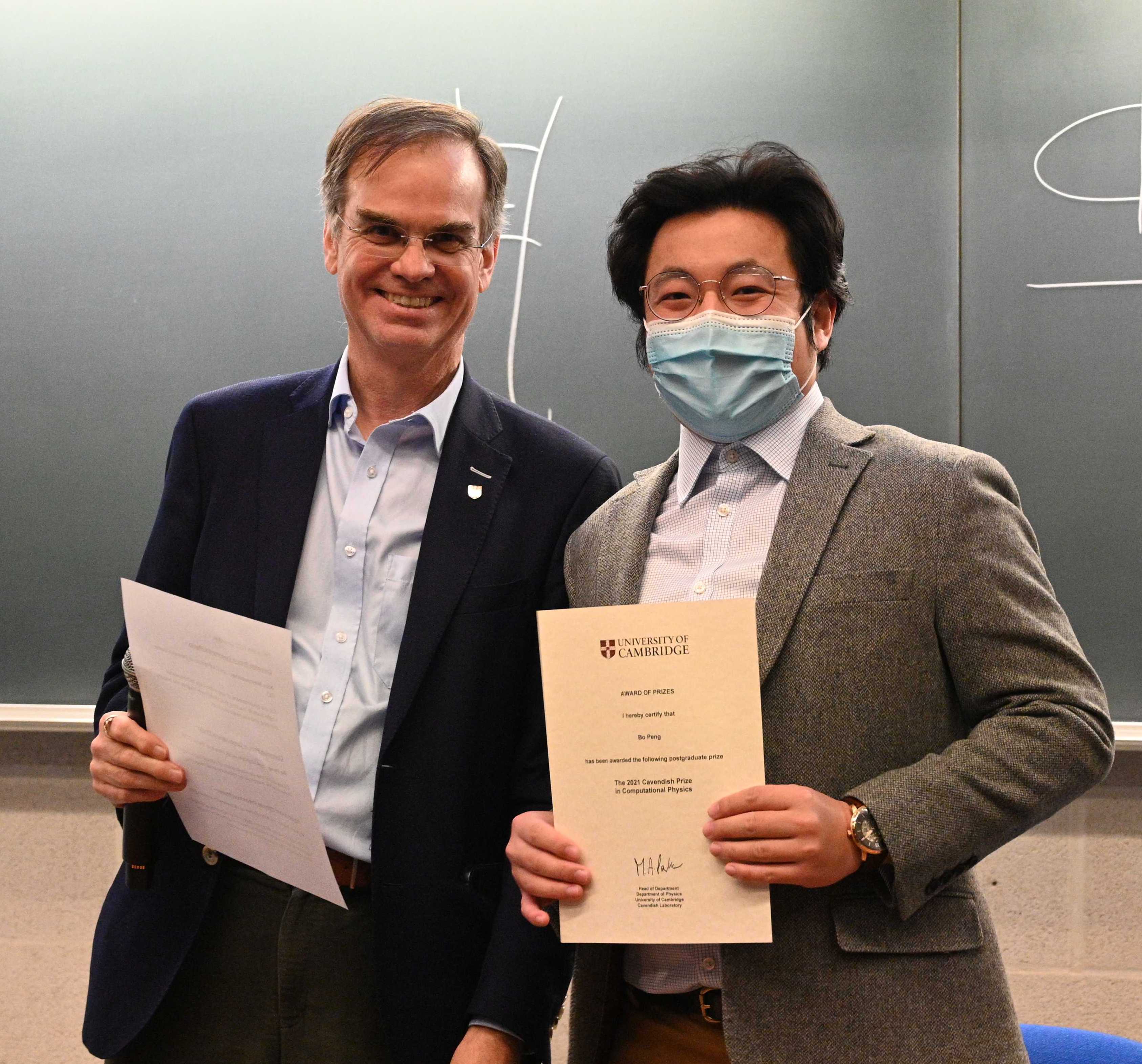 Bo Peng wins the 2022 Cavendish Prize in Computational Physics, presented annually to recognise outstanding work by a PhD student in the Physics Department of the University of Cambridge. Bo has received the prize for his work on Topological phonons in oxide perovskites controlled by light. Read more about this here.
Bo Peng wins the 2022 Cavendish Prize in Computational Physics, presented annually to recognise outstanding work by a PhD student in the Physics Department of the University of Cambridge. Bo has received the prize for his work on Topological phonons in oxide perovskites controlled by light. Read more about this here.
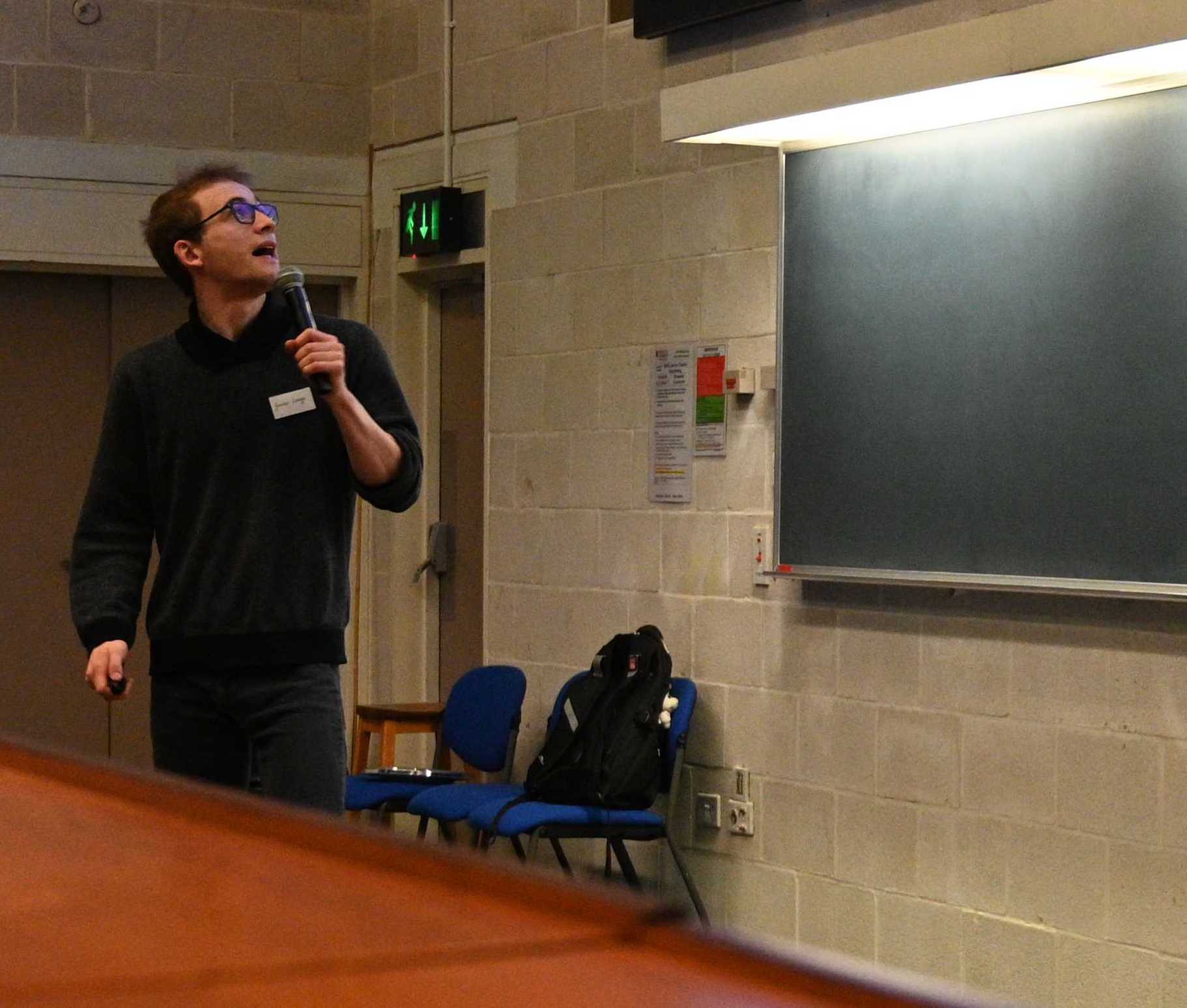 Gunnar Lange wins the second prize for Best Talk at the Cavendish Graduate Student Conference, which displays frontier research conducted by current students at the Physics Department of the University of Cambridge. The talk presented Gunnar's work on Topology of Acoustic Phonons in 2D Materials.
Gunnar Lange wins the second prize for Best Talk at the Cavendish Graduate Student Conference, which displays frontier research conducted by current students at the Physics Department of the University of Cambridge. The talk presented Gunnar's work on Topology of Acoustic Phonons in 2D Materials.
 Bartomeu receives a Future Leaders Fellowship from UK Research and Innovation (UKRI). The award of £1.5 million will support our research on the development of novel quantum materials for next-generation green technologies over the next four years. You can read more about this here.
Bartomeu receives a Future Leaders Fellowship from UK Research and Innovation (UKRI). The award of £1.5 million will support our research on the development of novel quantum materials for next-generation green technologies over the next four years. You can read more about this here.
- Xejay Ng successfully defends his MPhil thesis. The work looks at point defects in lead halide perovskites, explaining how they impact the optoelectronic properties of the hosts.
2020
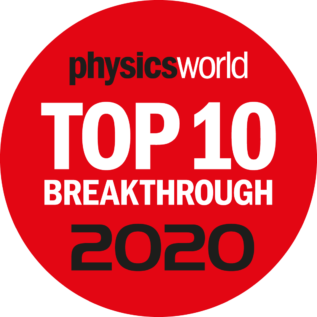 Our paper Speed of sound from fundamental physical constants published in Science Advances is selected as one of the 2020 Physics World Top 10 Breakthroughs of the Year. The citation states that the breakthrough is presented for calculations showing that the upper limit on the speed of sound in solids and liquids depends on just two dimensionless quantities – the fine structure constant and the proton-to-electron mass ratio.
Our paper Speed of sound from fundamental physical constants published in Science Advances is selected as one of the 2020 Physics World Top 10 Breakthroughs of the Year. The citation states that the breakthrough is presented for calculations showing that the upper limit on the speed of sound in solids and liquids depends on just two dimensionless quantities – the fine structure constant and the proton-to-electron mass ratio.
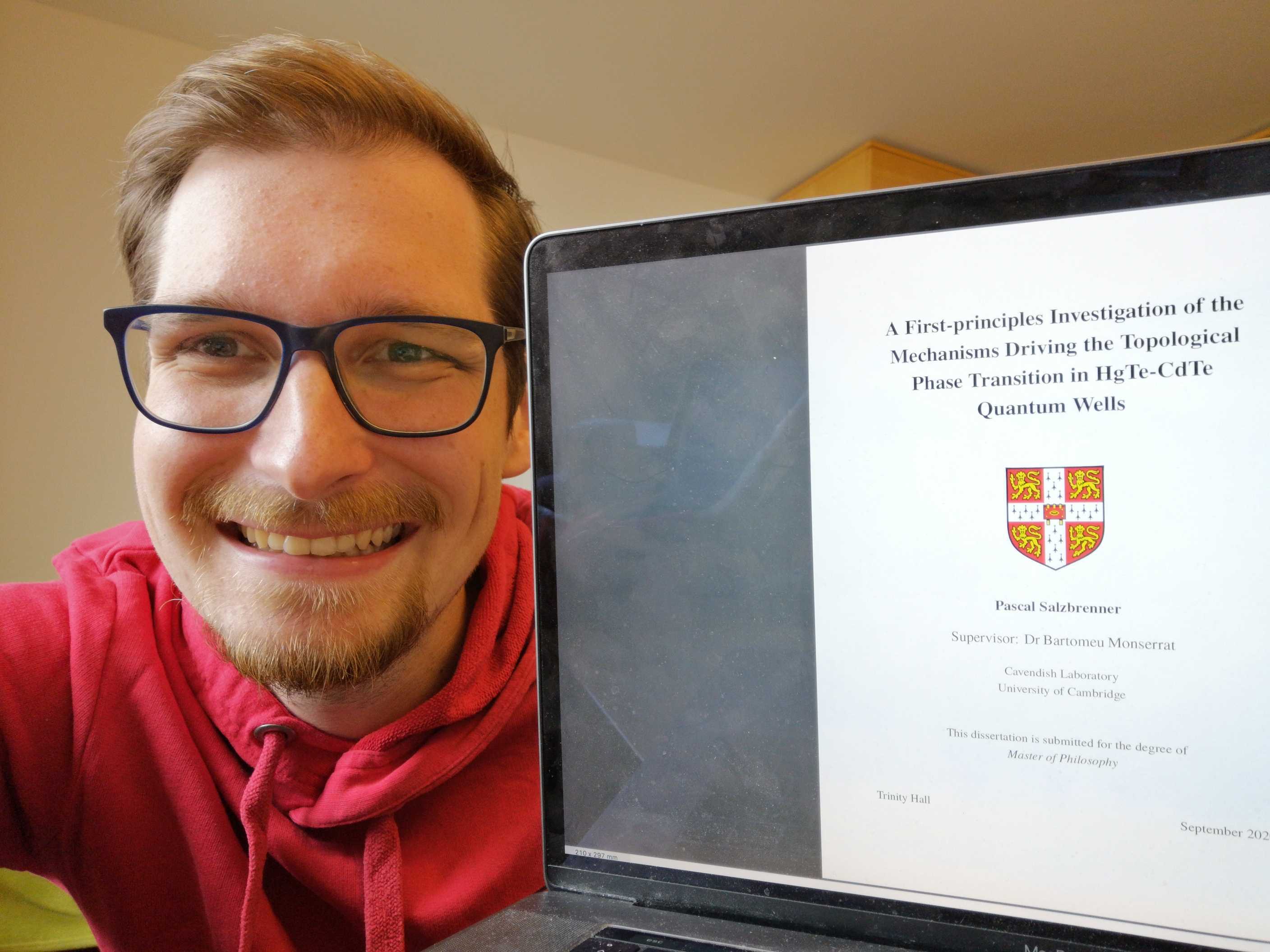 Pascal Salzbrenner successfully defends his MPhil thesis. The work looks at temperature-induced topological phase transitions in HgTe-CdTe quantum wells, explaining the microscopic mechanisms behind them. Pascal will continue his research pursuing a PhD at the Materials Department in Cambridge with Prof. Chris Pickard. Good luck!
Pascal Salzbrenner successfully defends his MPhil thesis. The work looks at temperature-induced topological phase transitions in HgTe-CdTe quantum wells, explaining the microscopic mechanisms behind them. Pascal will continue his research pursuing a PhD at the Materials Department in Cambridge with Prof. Chris Pickard. Good luck!
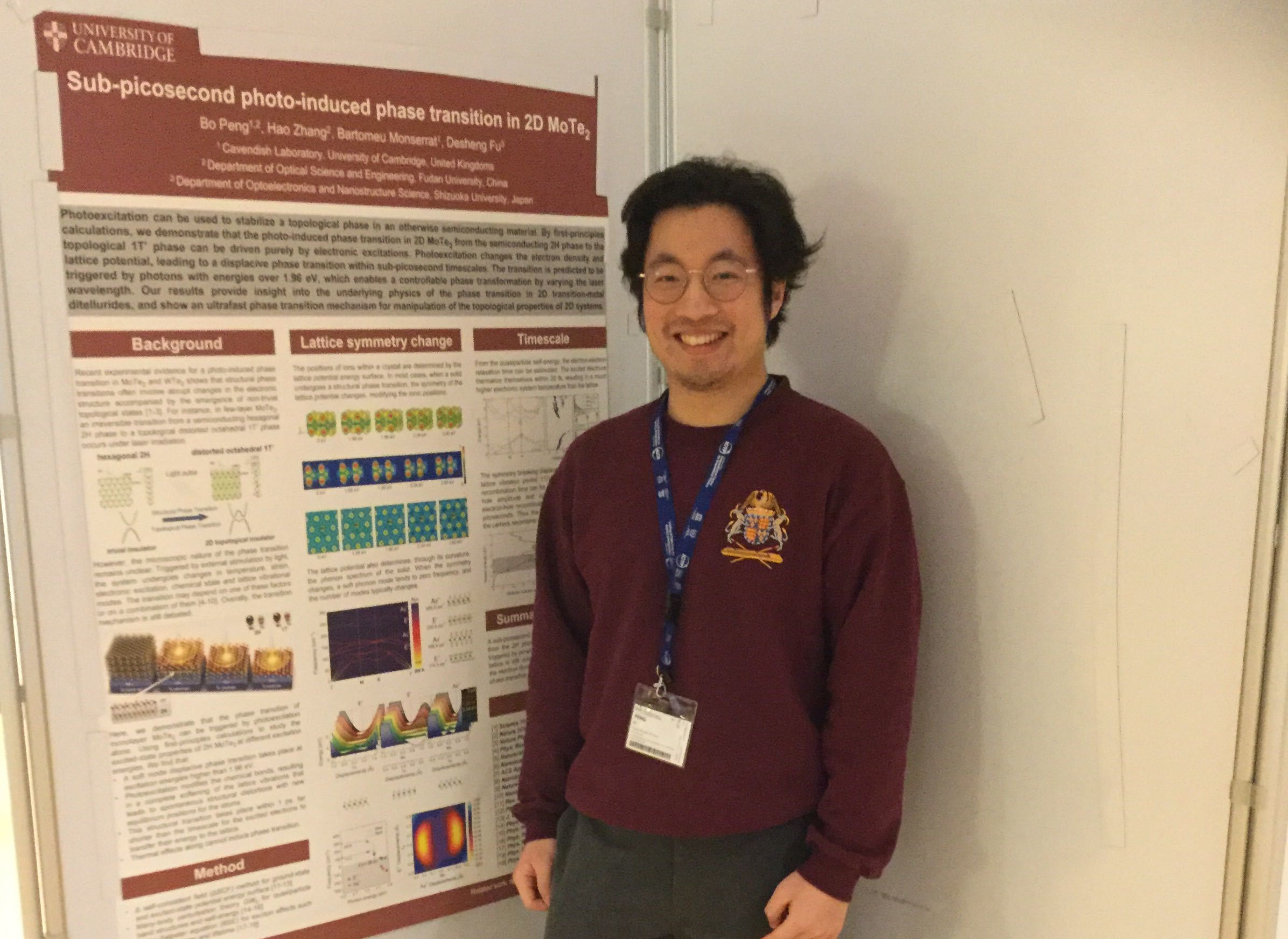 Bo Peng wins the Best Poster prize at the Computational School on Electronic Excitations in Novel Materials Using the Yambo Code held at the International Centre for Theoretical Physics in Trieste, Italy. The winning poster was entitled Sub-picosecond photo-induced phase transition in 2D MoTe2, and the prize consisted of a diploma and a copy of the Fetter and Walecka book on Quantum Theory of Many-Particle Systems.
Bo Peng wins the Best Poster prize at the Computational School on Electronic Excitations in Novel Materials Using the Yambo Code held at the International Centre for Theoretical Physics in Trieste, Italy. The winning poster was entitled Sub-picosecond photo-induced phase transition in 2D MoTe2, and the prize consisted of a diploma and a copy of the Fetter and Walecka book on Quantum Theory of Many-Particle Systems.
- The Monserrat Group moves to the Department of Materials Science and Metallurgy of the University of Cambridge. Bartomeu becomes the Gianna Angelopoulos Lecturer in Computational Materials Science.
2019
-
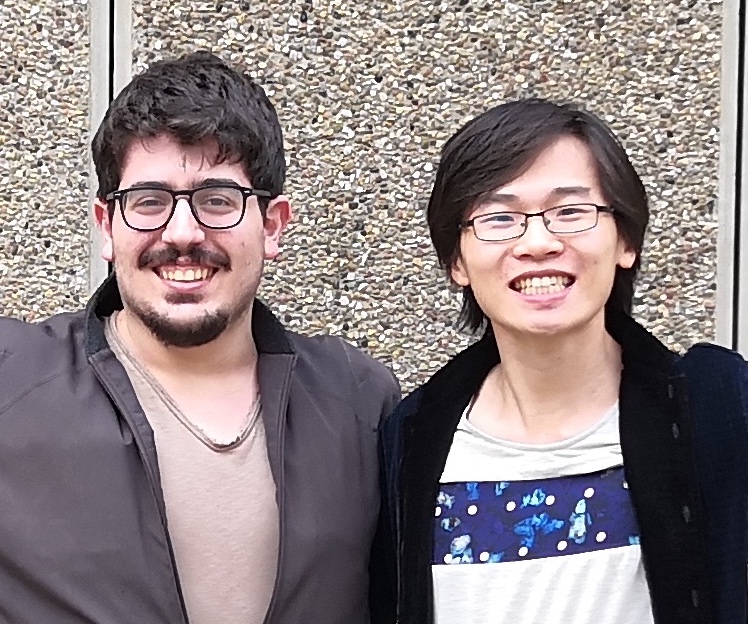 Kemal Atalar and Siyu Chen successfully defend their MPhil theses. Kem's thesis discusses the superconducting properties of incommensurate crystals, which he finds are dominated by electron-phason coupling. He will continue his research at Imperial College London where he will pursue a PhD. Siyu's thesis discusses stanene as a 2-dimensional topological insulator, discovering that its topological properties are robust all the way to room temperature. He will continue his work in the group to pursue a PhD.
Kemal Atalar and Siyu Chen successfully defend their MPhil theses. Kem's thesis discusses the superconducting properties of incommensurate crystals, which he finds are dominated by electron-phason coupling. He will continue his research at Imperial College London where he will pursue a PhD. Siyu's thesis discusses stanene as a 2-dimensional topological insulator, discovering that its topological properties are robust all the way to room temperature. He will continue his work in the group to pursue a PhD.
2018
 Siyu Chen is selected as runner-up of the Sam Edwards PhD Thesis Prize of the Institute of Physics for the best thesis in the field of theoretical condensed matter physics. Siyu's thesis proposes a new computational method exploiting non-uniform grids to accelerate phonon and electron-phonon calculations. Using this method, Siyu also explores the properties of two-dimensional and three-dimensional topological materials, superconductors, and high pressure hydrides. Congratulations!
Siyu Chen is selected as runner-up of the Sam Edwards PhD Thesis Prize of the Institute of Physics for the best thesis in the field of theoretical condensed matter physics. Siyu's thesis proposes a new computational method exploiting non-uniform grids to accelerate phonon and electron-phonon calculations. Using this method, Siyu also explores the properties of two-dimensional and three-dimensional topological materials, superconductors, and high pressure hydrides. Congratulations! Mingran Kong successfully defends his MPhil thesis. The work proposes a novel theoretical framework to study electron-phonon coupling in the presence of anharmonic phonon-phonon interactions. Mingran will continue his work in the group to pursue a PhD. Good luck!
Mingran Kong successfully defends his MPhil thesis. The work proposes a novel theoretical framework to study electron-phonon coupling in the presence of anharmonic phonon-phonon interactions. Mingran will continue his work in the group to pursue a PhD. Good luck!  Bartomeu wins the Philip Leverhulme Prize in Physics, presented by the Leverhulme Trust for work on computational physics, computational materials science, electronic structure, and energy materials. The Philip Leverhulme Prizes recognise and celebrate the achievements of outstanding researchers whose work has already attracted international recognition and whose future careers are exceptionally promising, and a full list of awardees can be found here.
Bartomeu wins the Philip Leverhulme Prize in Physics, presented by the Leverhulme Trust for work on computational physics, computational materials science, electronic structure, and energy materials. The Philip Leverhulme Prizes recognise and celebrate the achievements of outstanding researchers whose work has already attracted international recognition and whose future careers are exceptionally promising, and a full list of awardees can be found here.  Audrey Miles successfully completes her MPhil thesis and wins the JD Lewins Prize for the Best Distinction Level Project and Dissertation. The work develops a machine learning model that enables the simulation of nuclear fuels accurately and efficiently. Audrey will next pursue a PhD at the University of California Irvine. Congratulations and good luck!
Audrey Miles successfully completes her MPhil thesis and wins the JD Lewins Prize for the Best Distinction Level Project and Dissertation. The work develops a machine learning model that enables the simulation of nuclear fuels accurately and efficiently. Audrey will next pursue a PhD at the University of California Irvine. Congratulations and good luck! Sun-Woo Kim is awarded a Leverhulme Trust Early Career Fellowship to be hosted at the Department of Materials Science and Metallurgy of the University of Cambridge. This is a prestigious three-year position that will allow Sun-Woo to start his own independent research career in September 2024. During the fellowship, Sun-Woo will work on the interplay between charge density waves and superconductivity. Congratulations!
Sun-Woo Kim is awarded a Leverhulme Trust Early Career Fellowship to be hosted at the Department of Materials Science and Metallurgy of the University of Cambridge. This is a prestigious three-year position that will allow Sun-Woo to start his own independent research career in September 2024. During the fellowship, Sun-Woo will work on the interplay between charge density waves and superconductivity. Congratulations!  Audrey Miles wins the Best Poster Prize at the 6th Atalante Conference on Nuclear Chemistry for Sustainable Fuel Cycles in Avignon, France. Audrey has received the prize for her work building a machine learning model that enables simulating nuclear fuels accurately and efficiently. Congratulations!
Audrey Miles wins the Best Poster Prize at the 6th Atalante Conference on Nuclear Chemistry for Sustainable Fuel Cycles in Avignon, France. Audrey has received the prize for her work building a machine learning model that enables simulating nuclear fuels accurately and efficiently. Congratulations! Eleanor Davison successfully defends her MPhil thesis. The work explores the diffusion and dynamics of excitons in the presence of van Hove singularities. Eleanor will continue her work in the group to pursue a PhD. Good luck!
Eleanor Davison successfully defends her MPhil thesis. The work explores the diffusion and dynamics of excitons in the presence of van Hove singularities. Eleanor will continue her work in the group to pursue a PhD. Good luck!  Sun-Woo Kim wins the KSEAUK Outstanding Early Career Research Award. The award recognises exceptional contributions to science and technology by early career researchers, and you can read about all the winners here. Congratulations!
Sun-Woo Kim wins the KSEAUK Outstanding Early Career Research Award. The award recognises exceptional contributions to science and technology by early career researchers, and you can read about all the winners here. Congratulations!  Bo Peng wins the Sam Edwards PhD Thesis Prize of the Institute of Physics for the best thesis in the field of theoretical condensed matter physics. Bo's thesis explored various aspects of topological materials, highlighting pioneering work in the exploration of multi-gap Euler topology in the phonon spectrum of real materials. Bo is currently the Nevile Junior Research Fellow at Magdalene College Cambridge, exploring, amongst other things, the use of fullerenes to trap and manipulate atoms for various applications to quantum science. Congratulations!
Bo Peng wins the Sam Edwards PhD Thesis Prize of the Institute of Physics for the best thesis in the field of theoretical condensed matter physics. Bo's thesis explored various aspects of topological materials, highlighting pioneering work in the exploration of multi-gap Euler topology in the phonon spectrum of real materials. Bo is currently the Nevile Junior Research Fellow at Magdalene College Cambridge, exploring, amongst other things, the use of fullerenes to trap and manipulate atoms for various applications to quantum science. Congratulations! Sun-Woo Kim wins a Best Poster Prize at the QUANTUMatter2024 Conference in Donostia, Spain. Sun-Woo has received the prize for his work critically analysing two room temperature superconductivity claims, and you can read more about this research in these papers: Nature Communications, npj Computational Materials. Congratulations!
Sun-Woo Kim wins a Best Poster Prize at the QUANTUMatter2024 Conference in Donostia, Spain. Sun-Woo has received the prize for his work critically analysing two room temperature superconductivity claims, and you can read more about this research in these papers: Nature Communications, npj Computational Materials. Congratulations! Siyu Chen successfully defends his PhD thesis. The work proposes a new computational method exploiting non-uniform grids to accelerate phonon and electron-phonon calculations. Using this method, Siyu also explores the properties of two-dimensional and three-dimensional topological materials, superconductors, and high pressure hydrides. Siyu will continue working in the Monserrat Lab as a Postdoctoral Research Associate to further develop our phonon and electron-phonon software. Looking forward to more exciting results!
Siyu Chen successfully defends his PhD thesis. The work proposes a new computational method exploiting non-uniform grids to accelerate phonon and electron-phonon calculations. Using this method, Siyu also explores the properties of two-dimensional and three-dimensional topological materials, superconductors, and high pressure hydrides. Siyu will continue working in the Monserrat Lab as a Postdoctoral Research Associate to further develop our phonon and electron-phonon software. Looking forward to more exciting results! Arjun Ashoka successfully defends his PhD thesis. The work focuses on studying quantum processes in disordered materials combining experiment and theory. His experimental work develops new techniques for 3D ultrafast microscopy with which he investigates a range of quantum processes, from the formation of entangled states in an organic semiconductor to spin domain formation in halide perovskites. His theoretical work develops the foundation with which to study the sub-bandgap absorption tail in high performance semiconductors that arises from dynamic disorder through the presence of lattice vibrations. Arjun is now building his independent research career as a Junior Research Fellow at Trinity College Cambridge. Good luck!
Arjun Ashoka successfully defends his PhD thesis. The work focuses on studying quantum processes in disordered materials combining experiment and theory. His experimental work develops new techniques for 3D ultrafast microscopy with which he investigates a range of quantum processes, from the formation of entangled states in an organic semiconductor to spin domain formation in halide perovskites. His theoretical work develops the foundation with which to study the sub-bandgap absorption tail in high performance semiconductors that arises from dynamic disorder through the presence of lattice vibrations. Arjun is now building his independent research career as a Junior Research Fellow at Trinity College Cambridge. Good luck! Gunnar Lange successfully defends his PhD thesis. The work explores the topological features of electron and phonon spectra, highlighting the existence of topological phases beyond the standard characterisation based on symmetry eigenvalues. Gunnar will continue his great work at the Max Planck Institute for the Physics of Complex Systems in Dresden. Good luck!
Gunnar Lange successfully defends his PhD thesis. The work explores the topological features of electron and phonon spectra, highlighting the existence of topological phases beyond the standard characterisation based on symmetry eigenvalues. Gunnar will continue his great work at the Max Planck Institute for the Physics of Complex Systems in Dresden. Good luck! Sun-Woo Kim wins the 2023 Young Physicist Award presented by the Korean Physical Society. The prize is presented annually to early-career researchers and you can read more about this here (in Korean). Congratulations Sun-Woo!
Sun-Woo Kim wins the 2023 Young Physicist Award presented by the Korean Physical Society. The prize is presented annually to early-career researchers and you can read more about this here (in Korean). Congratulations Sun-Woo! Bo Peng successfully defends his PhD thesis. The work explores the topological features of phonon spectra, with highlights including the prediction of light-induced topological transitions in perovskites and the pioneering exploration of multi-gap Euler topology in real materials. Bo has also completed a significant number of side projects, which include the study of light emission in doped perovskites nanocrystals, photostriction in halide perovskites, and monolayer fullerenes. Bo is now building his independent research career with a Nevile Junior Research Fellow at Magdalene College Cambridge. Good luck!
Bo Peng successfully defends his PhD thesis. The work explores the topological features of phonon spectra, with highlights including the prediction of light-induced topological transitions in perovskites and the pioneering exploration of multi-gap Euler topology in real materials. Bo has also completed a significant number of side projects, which include the study of light emission in doped perovskites nanocrystals, photostriction in halide perovskites, and monolayer fullerenes. Bo is now building his independent research career with a Nevile Junior Research Fellow at Magdalene College Cambridge. Good luck! Bartomeu Monserrat is promoted to Professor of Materials Physics, starting in October 2023. This promotion recognises the research work of the entire group, as well as our teaching and service contributions.
Bartomeu Monserrat is promoted to Professor of Materials Physics, starting in October 2023. This promotion recognises the research work of the entire group, as well as our teaching and service contributions. Arjun Ashoka is awarded a Junior Research Fellowship at Trinity College Cambridge. This is a prestigious four-year position that will allow Arjun to start his own independent research career in October 2023. Arjun's work will focus on investigating how to drive single phonons and watch their effect on electronic transport on femtosecond timescales in semiconductors. Good luck!
Arjun Ashoka is awarded a Junior Research Fellowship at Trinity College Cambridge. This is a prestigious four-year position that will allow Arjun to start his own independent research career in October 2023. Arjun's work will focus on investigating how to drive single phonons and watch their effect on electronic transport on femtosecond timescales in semiconductors. Good luck!  Emily Chen successfully defends her MPhil thesis. The work looks at the phonons in layered perovskites, characterising their properties for the first time. Emily will continue her research pursuing a PhD at Stanford University. Good luck!
Emily Chen successfully defends her MPhil thesis. The work looks at the phonons in layered perovskites, characterising their properties for the first time. Emily will continue her research pursuing a PhD at Stanford University. Good luck!  Bartomeu Monserrat wins the 2022 Young Researcher in Theoretical Physics Prize presented by the Spanish Royal Society of Physics and the BBVA Foundation. The Prize has been presented annually since 1968, and you can read more about this here (in Spanish).
Bartomeu Monserrat wins the 2022 Young Researcher in Theoretical Physics Prize presented by the Spanish Royal Society of Physics and the BBVA Foundation. The Prize has been presented annually since 1968, and you can read more about this here (in Spanish).  Siyu Chen wins the 2023 Abdus Salam Prize in Computational Physics, presented annually to recognise outstanding work by a PhD student in the Physics Department of the University of Cambridge. Siyu has received the prize for his work on Nonuniform grids for Brillouin zone integration and interpolation. Read more about this here.
Siyu Chen wins the 2023 Abdus Salam Prize in Computational Physics, presented annually to recognise outstanding work by a PhD student in the Physics Department of the University of Cambridge. Siyu has received the prize for his work on Nonuniform grids for Brillouin zone integration and interpolation. Read more about this here. Arjun Ashoka wins the 2023 Cavendish Prize in Experimental Physics, presented annually to recognise outstanding work by a PhD student in the Physics Department of the University of Cambridge. Arjun has received the prize for his work on Quantum processes in disordered materials. Read more about this here.
Arjun Ashoka wins the 2023 Cavendish Prize in Experimental Physics, presented annually to recognise outstanding work by a PhD student in the Physics Department of the University of Cambridge. Arjun has received the prize for his work on Quantum processes in disordered materials. Read more about this here. Ivona Bravić successfully defends her PhD thesis. The work explores the role of disorder, both static and dynamic, on the optoelectronic properties of semiconductors. Highlights include the microscopic understanding of how doping perovskite nanocrystals can be used to control their light emission properties, and the role of dynamic disorder in the optoelectronic properties of BiOI, a record-sensitivity X-ray detector material. Ivona will continue her excellent work in the energy area at LBD-Beratungsgesellschaft. Good luck!
Ivona Bravić successfully defends her PhD thesis. The work explores the role of disorder, both static and dynamic, on the optoelectronic properties of semiconductors. Highlights include the microscopic understanding of how doping perovskite nanocrystals can be used to control their light emission properties, and the role of dynamic disorder in the optoelectronic properties of BiOI, a record-sensitivity X-ray detector material. Ivona will continue her excellent work in the energy area at LBD-Beratungsgesellschaft. Good luck! Dr Yun Liu has started a new position as a Research Scientist at the Institute of High Performance Computing in Singapore. He can be reached at this email address. Good luck Yun!
Dr Yun Liu has started a new position as a Research Scientist at the Institute of High Performance Computing in Singapore. He can be reached at this email address. Good luck Yun!  Bo Peng wins a Poster Commendation at the Psi-K 2022 Conference. Commendations have been awarded to 60 posters among the 715 presented. Bo has received the prize for his work on Non-Abelian braiding of phonons, and you can read more about this research in these papers: Nature Communications, Physical Review B. Congratulations!
Bo Peng wins a Poster Commendation at the Psi-K 2022 Conference. Commendations have been awarded to 60 posters among the 715 presented. Bo has received the prize for his work on Non-Abelian braiding of phonons, and you can read more about this research in these papers: Nature Communications, Physical Review B. Congratulations! Bo Peng wins a 2021 Chinese Government Award for Outstanding Students Abroad, presented annually by the China Scholarship Council to recognise outstanding Chinese students all over the world. Congratulations Bo!
Bo Peng wins a 2021 Chinese Government Award for Outstanding Students Abroad, presented annually by the China Scholarship Council to recognise outstanding Chinese students all over the world. Congratulations Bo! Alan Bowman wins the Woodruff Thesis Prize of the Institute of Physics for the best thesis in the field of thin film and surface science. Alan's thesis studied new materials for solar cells with a comprehensive approach including both experimental and theoretical work. Alan is currently working as a Postdoc at the École Polytechnique Fédérale de Lausanne in Switzerland, investigating the conversion of CO2 to other chemicals using nanoparticles. Congratulations!
Alan Bowman wins the Woodruff Thesis Prize of the Institute of Physics for the best thesis in the field of thin film and surface science. Alan's thesis studied new materials for solar cells with a comprehensive approach including both experimental and theoretical work. Alan is currently working as a Postdoc at the École Polytechnique Fédérale de Lausanne in Switzerland, investigating the conversion of CO2 to other chemicals using nanoparticles. Congratulations!  We receive a Programme Grant from the Engineering and Physical Sciences Research Council (EPSRC) as part of a team of Cambridge and Oxford scientists. The award of £8.6 million will support research on transport phenomena in a wide range of materials, using both experimental and computational techniques. You can read more about this here.
We receive a Programme Grant from the Engineering and Physical Sciences Research Council (EPSRC) as part of a team of Cambridge and Oxford scientists. The award of £8.6 million will support research on transport phenomena in a wide range of materials, using both experimental and computational techniques. You can read more about this here.  We receive a Critical Mass Grant from the Engineering and Physical Sciences Research Council (EPSRC) as part of a team of theorists across several Cambridge departments. The award of £3.7 million will support research on theory of condensed matter with a particular focus on dynamical phenomena. You can read more about this here.
We receive a Critical Mass Grant from the Engineering and Physical Sciences Research Council (EPSRC) as part of a team of theorists across several Cambridge departments. The award of £3.7 million will support research on theory of condensed matter with a particular focus on dynamical phenomena. You can read more about this here.  Bo Peng is awarded the Nevile Junior Research Fellowship at Magdalene College Cambridge. This is a prestigious three-year position that will allow Bo to start his own independent research career in October 2022. Bo's work will focus on searching for new materials hosting topological phonons and their potential applications in information technologies. Good luck!
Bo Peng is awarded the Nevile Junior Research Fellowship at Magdalene College Cambridge. This is a prestigious three-year position that will allow Bo to start his own independent research career in October 2022. Bo's work will focus on searching for new materials hosting topological phonons and their potential applications in information technologies. Good luck!  Alya Bin Thabet Alqaydi successfully defends her MPhil thesis. The work looks at graph neural networks to predict material properties, demonstrating performances surpassing the current state-of-the-art. Alya will continue her research towards a PhD with the group.
Alya Bin Thabet Alqaydi successfully defends her MPhil thesis. The work looks at graph neural networks to predict material properties, demonstrating performances surpassing the current state-of-the-art. Alya will continue her research towards a PhD with the group.  Bartomeu wins the 2021 James Clerk Maxwell Medal and Prize, presented by the Institute of Physics for exceptional contributions to the development of computational techniques that bring temperature to modern electronic structure methods, and their application to topological materials, photovoltaics, superconductors and planetary physics. The Medal was first presented in 1962, and a full list of awardees can be found here.
Bartomeu wins the 2021 James Clerk Maxwell Medal and Prize, presented by the Institute of Physics for exceptional contributions to the development of computational techniques that bring temperature to modern electronic structure methods, and their application to topological materials, photovoltaics, superconductors and planetary physics. The Medal was first presented in 1962, and a full list of awardees can be found here.  Bo Peng wins the 2022 Cavendish Prize in Computational Physics, presented annually to recognise outstanding work by a PhD student in the Physics Department of the University of Cambridge. Bo has received the prize for his work on Topological phonons in oxide perovskites controlled by light. Read more about this here.
Bo Peng wins the 2022 Cavendish Prize in Computational Physics, presented annually to recognise outstanding work by a PhD student in the Physics Department of the University of Cambridge. Bo has received the prize for his work on Topological phonons in oxide perovskites controlled by light. Read more about this here. Gunnar Lange wins the second prize for Best Talk at the Cavendish Graduate Student Conference, which displays frontier research conducted by current students at the Physics Department of the University of Cambridge. The talk presented Gunnar's work on Topology of Acoustic Phonons in 2D Materials.
Gunnar Lange wins the second prize for Best Talk at the Cavendish Graduate Student Conference, which displays frontier research conducted by current students at the Physics Department of the University of Cambridge. The talk presented Gunnar's work on Topology of Acoustic Phonons in 2D Materials. Bartomeu receives a Future Leaders Fellowship from UK Research and Innovation (UKRI). The award of £1.5 million will support our research on the development of novel quantum materials for next-generation green technologies over the next four years. You can read more about this here.
Bartomeu receives a Future Leaders Fellowship from UK Research and Innovation (UKRI). The award of £1.5 million will support our research on the development of novel quantum materials for next-generation green technologies over the next four years. You can read more about this here.  Our paper Speed of sound from fundamental physical constants published in Science Advances is selected as one of the 2020 Physics World Top 10 Breakthroughs of the Year. The citation states that the breakthrough is presented for calculations showing that the upper limit on the speed of sound in solids and liquids depends on just two dimensionless quantities – the fine structure constant and the proton-to-electron mass ratio.
Our paper Speed of sound from fundamental physical constants published in Science Advances is selected as one of the 2020 Physics World Top 10 Breakthroughs of the Year. The citation states that the breakthrough is presented for calculations showing that the upper limit on the speed of sound in solids and liquids depends on just two dimensionless quantities – the fine structure constant and the proton-to-electron mass ratio. Pascal Salzbrenner successfully defends his MPhil thesis. The work looks at temperature-induced topological phase transitions in HgTe-CdTe quantum wells, explaining the microscopic mechanisms behind them. Pascal will continue his research pursuing a PhD at the Materials Department in Cambridge with Prof. Chris Pickard. Good luck!
Pascal Salzbrenner successfully defends his MPhil thesis. The work looks at temperature-induced topological phase transitions in HgTe-CdTe quantum wells, explaining the microscopic mechanisms behind them. Pascal will continue his research pursuing a PhD at the Materials Department in Cambridge with Prof. Chris Pickard. Good luck! Bo Peng wins the Best Poster prize at the Computational School on Electronic Excitations in Novel Materials Using the Yambo Code held at the International Centre for Theoretical Physics in Trieste, Italy. The winning poster was entitled Sub-picosecond photo-induced phase transition in 2D MoTe2, and the prize consisted of a diploma and a copy of the Fetter and Walecka book on Quantum Theory of Many-Particle Systems.
Bo Peng wins the Best Poster prize at the Computational School on Electronic Excitations in Novel Materials Using the Yambo Code held at the International Centre for Theoretical Physics in Trieste, Italy. The winning poster was entitled Sub-picosecond photo-induced phase transition in 2D MoTe2, and the prize consisted of a diploma and a copy of the Fetter and Walecka book on Quantum Theory of Many-Particle Systems. Kemal Atalar and Siyu Chen successfully defend their MPhil theses. Kem's thesis discusses the superconducting properties of incommensurate crystals, which he finds are dominated by electron-phason coupling. He will continue his research at Imperial College London where he will pursue a PhD. Siyu's thesis discusses stanene as a 2-dimensional topological insulator, discovering that its topological properties are robust all the way to room temperature. He will continue his work in the group to pursue a PhD.
Kemal Atalar and Siyu Chen successfully defend their MPhil theses. Kem's thesis discusses the superconducting properties of incommensurate crystals, which he finds are dominated by electron-phason coupling. He will continue his research at Imperial College London where he will pursue a PhD. Siyu's thesis discusses stanene as a 2-dimensional topological insulator, discovering that its topological properties are robust all the way to room temperature. He will continue his work in the group to pursue a PhD.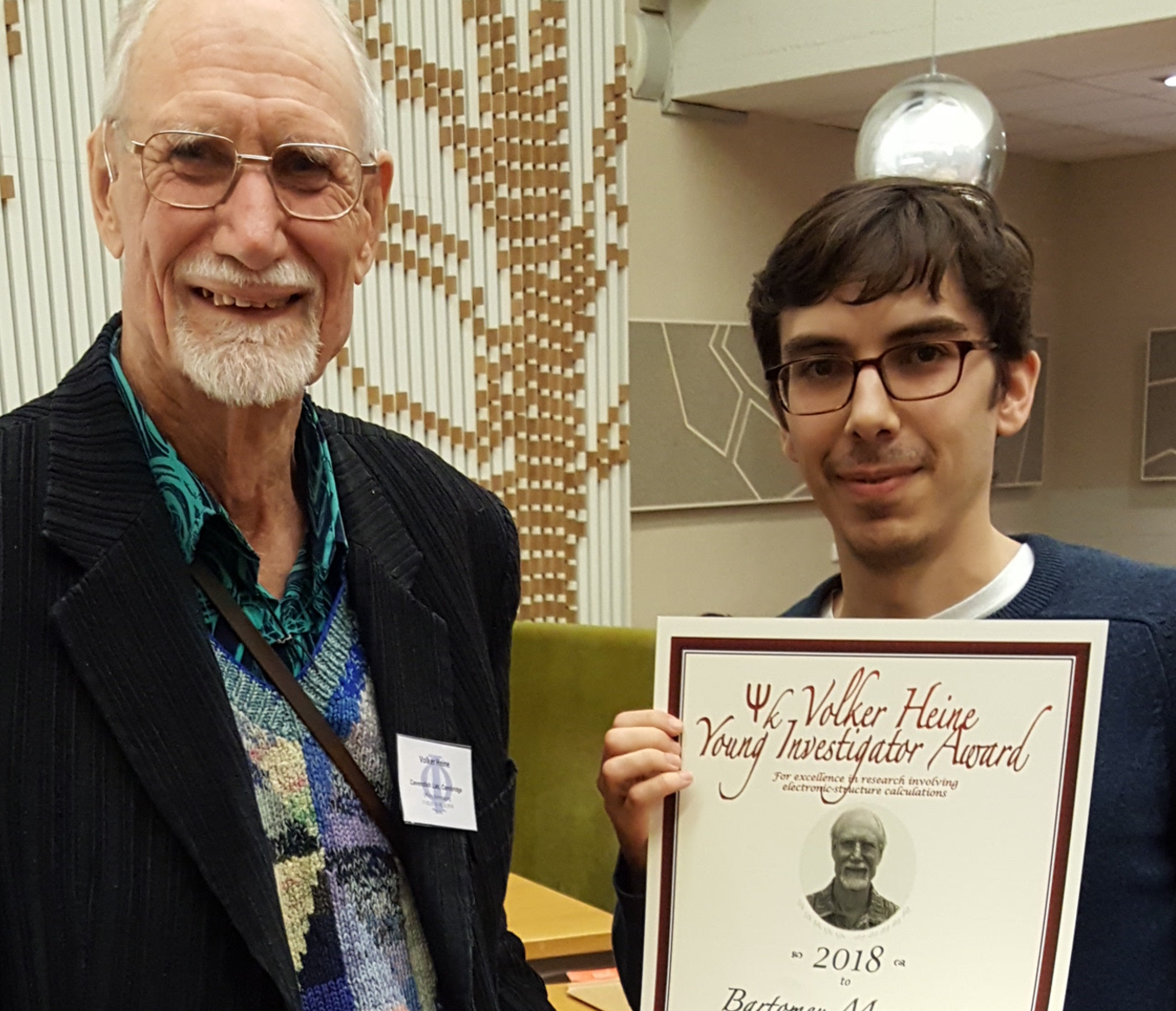 Bartomeu receives the Psi-k Volker Heine Young Investigator Award for his original research on temperature effects in spin-orbit physics from first principles. He won the award at an invited session of the DPG Spring Meeting in Berlin, Germany.
Bartomeu receives the Psi-k Volker Heine Young Investigator Award for his original research on temperature effects in spin-orbit physics from first principles. He won the award at an invited session of the DPG Spring Meeting in Berlin, Germany.